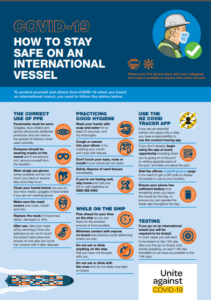Following the second wave of the COVID-19 pandemic, Maritime NZ issued a guidance on how seafarers can stay protected onboard international vessels amid the outbreak.
In light of the unprecedented coronavirus situation, it is vital for crewmembers to protect themselves and others from COVID-19 when boarding an international vessel. Therefore, Maritime NZ recommends:
Use Personal Protective Equipment (PPE) properly
Facemasks must be worn. Goggles, face shields and gloves will provide additional protection and can reduce the spread of infection when used correctly.
Everyone should be wearing masks on the vessel and if someone is not, remove yourself from the situation.
Wear single use gloves where possible and do not touch your face or anyone else once they’re on.
Clean your hands before you put on your face masks, goggles or face shield if you are not wearing gloves.
Make sure the mask covers your nose, mouth and chin. Replace the mask if it becomes damp, damaged or dirty.
After use, take your mask off by removing it from the earloops so as not to touch the actual mask piece and ensure no one else can come into contact with it after disposal.
While onboard
Plan ahead for your time on the ship so you are there for the shortest amount of time possible.
Minimise contact with anyone on-board and practice social distancing where you can.
Do not eat or drink anything on the ship that you have not brought with you.
Do not eat or drink with the crew and do not sleep overnight on board.
If you go on an international vessel you will be required to be tested. In most cases you will need to be tested on the 14th day after you first go on board, and, strictly speaking, on each 14th day thereafter (or as close as possible to the 14th day).
…as Maritime NZ noted.
Explore more herebelow































































